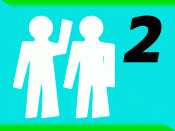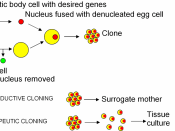Cloning human beings
The issues concerning human reproductive cloning are shrouded in controversy, perhaps overshadowing the true advantages of cloning technology. There are definitely advantages of cloning: individuals with fertility problems would be able to produce biologically related children, and couples who risk passing genetic disease to offspring would be able to have healthy children. However, cloning technology is still primitive, and although several attempts have yielded successful clones, human reproductive cloning should be temporarily banned because it is highly inefficient, psychologically dangerous, and ethically irresponsible.
There are a number of reasons why human cloning might be ruled out for the psychological dangers involved. No one knows what would be the effects on human identity and relationships of creating someone who is the twin of their father or mother, but born in a different generation and environment. Would the clone feel that he or she was just a copy of someone else who's already existed and not really themselves? Am I really someone else but put into a different womb? What will be my relationship to the one I was cloned from? No one can predict with any degree of assurance what the response would be.
Presumably they would vary from person to person. I suggest there sufficient dangers for applying the precautionary principle should apply. In other words, even though one could not be sure how many people would suffer in this way, it would be wrong knowingly to inflict that risk on someone. Whose interests are being put first?
There is also outstanding physical risk to clone human beings. Dolly took 277 attempts and nearly 30 failed pregnancies to get one success. To repeat the same thing on humans would be giving both the mother and the potential fetus an unacceptably high risk of damage. The basic science...



Good
I liked this, but not only is it wrong for medical reasons but mother nature creates all the diseses to stop an overpopulated world and if cloning were legal then this would stop and the world would implode with the weight from all the people. Thats my theory anyway. Great writing skills
0 out of 0 people found this comment useful.